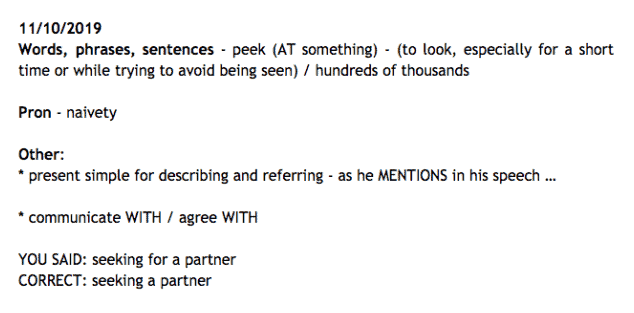Tips for teaching English online – 10 mind-blowing pieces of advice!
Teaching English online is a terrifically rewarding career path. That's why I'm keen to share a bunch of tips for teaching English online with you.
Is it the end of the world if you're so eager to teach English online but don’t have a degree?
No - it isn’t the end of the world!
Social media, personality, desire and ideas matter far more than qualifications.
After all, very few of the students I’ve recruited in recent years have taken an interest in my degree certificates.
In fact, my methods and knowledge of language learning strategies won them over.
Let's dive in for ten mind-blowing tips for teaching English online:
Tip 1: Build a personal profile that focuses on your positive character traits
Whether or not you’ve got a stack of qualifications and teaching certificates under your belt, you need to focus on building a personal profile in which your humanistic qualities and ideas shine through.
It’s not a piece of cake to become fluent in English. You need to respect this and radiate how you will walk potential students through the process of achieving their goals.
How?
You need to do a great deal of research into language learning strategies. How did you learn languages? What methods have polyglots used to master languages? Do students really need so much grammar to speak English confidently and fluently?
Humanistic qualities of integrity, respect and compassion matter a great deal when it comes to converting potential clients into happy customers.
Tip 2: Materials matter - create your own
Having used popular coursebook series in language schools for five years, I can safely say that I would never develop an entire study course for a student based solely on a coursebook.
In my view, most coursebooks create a damaging psychological distance between teachers and students. Having said that, the Innovations coursebook series is worth using due to the wealth of common lexical phrases the authors incorporated into the reading passages.
Looking back on the six years I’ve been teaching English online, I believe that one of the main reasons I have attracted and retained students is because I write and share my own texts with them.
In my texts, I don’t share information about my private life. Instead, I focus on sharing stories about things I’ve seen and done and my life, cultural observations and travel notes. Occasionally, I share my opinions on stories in world news.
Tip 3: Incorporate phrasal verbs and collocations typically used by native speakers into your texts
English language teachers shouldn’t be obsessed with grading vocabulary according to its perceived level of difficulty.
Collocations with get, make and do are very common in everyday speech, as are phrasal verbs. Focus on these!
When you write texts about your current situation and life experiences, try to incorporate common collocations and phrasal verbs into your writing.
Tip 4: Set very fair terms and conditions
You’ll get new students through word-of-mouth by being principled, honest and as non-materialistic as possible.
During an initial consultation meeting (not to be confused with a "trial lesson"), I tell my students that I tolerate same-day cancellations only three times. From the fourth same-day cancellation, I take 20 minutes from a student’s batch of prepaid minutes. As my lessons usually last between 15 and 30 minutes, I think that this penalty is more than fair.
I try to be tolerant with students who might be “running late”, so I don’t charge them if they’re five minutes late. However, if they inform me that they’ll be fifteen minutes late, I add ten minutes to the overall length of the lesson.
Another area I like to nip in the bud early on is the amount of “help” I’m willing to give to students. It’s not a problem for me to check students’ written stories, which contain previously learned vocabulary and phrases. Moreover, I’m happy to check personalised sentences in their Word-Phrase Tables. However, I refuse to check students’ business letters, website pages and personal correspondence and so on for free.
Tip 5: Look after students between lessons
It’s absolutely vital to keep students motivated between lessons.
I make a habit of sending lesson notes to my students after every lesson. In essence, I summarise new words and phrases, pronunciation errors and mistakes, together with corrections.
Here’s an example of a set of notes from a single lesson with one of my students from Russia:

A set of lesson notes for a student of English
It’s not all about updating lesson notes. I openly encourage students to send questions to me on Teams, particularly if clarification is sought pertaining to language encountered in a previous lesson.
For more information, check out this page with regard to the learning cycle I tend to implement with students.
Tip 6: Balance student talking time (STT) and teaching talking time (TTT)
Frankly, I’m not one of those teachers who likes the sound of their own voice. I remember a few teachers I worked with who spent a large amount of time in class talking about themselves.
Teaching Talking Time (TTT) should never be over 20% in a class which is based on communication. I reckon I'm at around 5% in my conversation classes.
If a student asks me questions about what’s going on in my life, I know they’re only being polite. However, I still get to the point as quickly as I can with my answers. Most students don’t want to hear teachers rambling on about themselves.
Tip 7: Provide feedback at the end of class
Online lessons should be free-flowing and interactive.
I tend to teach on Teams. Therefore, I often send instant messages while the class is in progress to confirm new words and phrases, grammar points and pronunciation errors. Most of my students are used to the fact that I explain all of these points at the end of every class.
In my view, the last thing that students need after every other utterance is a lecture on an obscure grammar point.
Allow students to speak without interrupting them every twenty seconds.
Tip 8: Don't speak too slowly
I remember it well - a learner once said to me: “You’re the only teacher that speaks fast to me”.
Judging by the tone of her voice, I think she saw my manner of speaking and approach as a challenge.
You shouldn’t let students try to make things easy for themselves by getting you to slow down or grade your language.
Comprehension and familiarity with native speaker speech comes with persistence and time. Do your best to get this point across to students.
Tip 9: Specialise - Don't offer every type of course under the sun!
When I notice that another teacher offers every kind of English language course under the sun to potential students, I think to myself - what a poor soul!
Imagine Mr Bloggs’ advert:
"I teach General English, Business English, KET, PET, FCE, CAE, CPE, TOEFL, Travel English, Medical English, Aviation English, IELTS, EAP, Cambridge English Young Learners Tests (YLE) and many, many more courses!"
Frankly, such an offer looks unconvincing and unprofessional. Where did Mr Bloggs amass all this experience to claim that he can teach these courses?
I have experience in many of the areas listed in Mr Bloggs’ advert. However, I prefer to play to my strengths.
I only have nine courses listed on my site. These are my “English Fluency Course”, In-Company English Courses in Poland, a Spoken English Course for Beginners, a British English Pronunciation Course, a Business English Speaking Course, three Cambridge exam courses and English Language Mentoring Sessions.
In truth, my “Fluency Course” course is the one which gets me out of bed in the morning. The course revolves around my own self-written texts and news articles which interest me. Therefore, I have a real personal connection with these materials. I believe that my enthusiasm rubs off on my students as well.
Tip 10: Offer short but regular classes
Most online teachers offer 45, 60 or 90 minute lessons. Do you really have to do the same?
No!
Do longer lessons necessarily lead to greater spoken competence and language acquisition?
Not at all!
Since 2013, I've been teaching a Polish student called Marek every second day. Our conversation classes, which are based on a range of self-written texts, articles from online news websites and TED talks, usually last around 15 minutes.
Most of my other students have classes once or twice a week. Hence, I tend to cover more ground with these students during slightly longer classes.
Having classes every second day ensures that English becomes a habit. Revision and preparation included, I am sure that Marek has contact with English every day.
If a student has only one ninety-minute class a week, they may become deluded into thinking that ninety minutes per week is enough to speak better English. They might think to themselves they don’t need to revise and work with new words and phrases every day because they cover so many exercises and pages during a single class.
In another post, I argued what I believe is the ideal duration of a private language lesson.
Overall, my best students are the ones who have SHORT but REGULAR classes.
Tips for teaching English online and marketing yourself as a teacher who cares!
If you pay heed to all of the above tips and have decent marketing skills, there’s no reason why you can’t make a name for yourself as a talented and sought-after online English language teacher.



